Do Not Obey In Advance: A Moral Crisis in Arts Funding
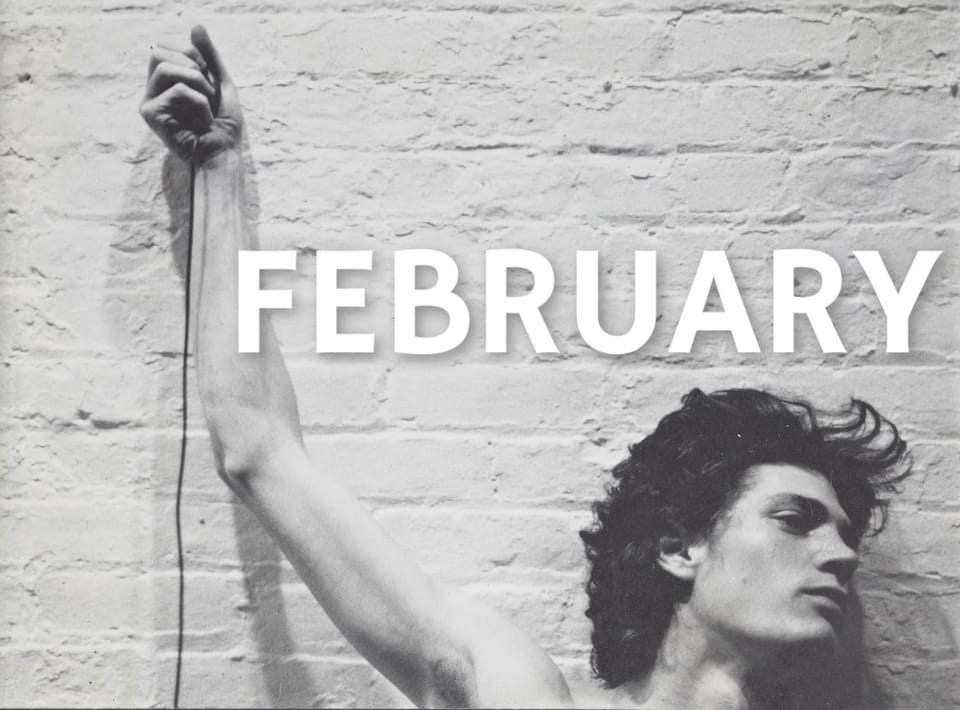
“Above all, we are coming to understand that the arts incarnate the creativity of a free people. When the creative impulse cannot flourish, when it cannot freely select its methods and objects, when it is deprived of spontaneity, then society severs the root of art.”
--John F. Kennedy
Welcome to 8th House! Here's a few helpful links if you're new in town:
- More about the vision behind 8th House
- Information on upcoming classes and workshops, including the March 8th Prospect Research Workshop on sale now
- November subscriber newsletter on tactical optimism amidst post-election grief
- September subscriber newsletter on money, power and fundraising under capitalism
One of the most important lessons I've ever learned about nonprofit work (and the world in general) is that a budget is a moral document.
Sometimes people with a vested interest in shaping that budget to their own benefit will try to convince you that it's not. They'll use bloodless words like "efficiency" and "streamlining" and "pragmatic" to make the process sound like a wholly left-brained one, beyond the realm of emotion. But the truth is that where your organization's funding comes from and how you spend it can tell us a lot about who you are. Your values, your priorities, what you are and aren't willing to compromise, whose work you think is important, who has a seat at the leadership table . . . all of that's in there, translated into numbers. And those numbers can shine a painful light on the lies you tell yourself, the messy ethical tangles which accompany this work. Maybe you talk a big game about your commitment to community outreach, but when push comes to shove, you aren't willing to spend much money on it. Maybe your foundation gives grants to environmental nonprofits, but you haven't divested from your own highly profitable investments in fossil fuels. The real story is always there in the numbers.
I've received painful reminders of this lesson many, many times over the course of my nonprofit career, but I actually learned it for the first time from my mother. She was involved in nonprofits for most of my life, and took ethical fundraising incredibly seriously. When I was a freshman in college, home on break, I remember sitting in her study with her when the phone rang, and after a few moments she put it on speakerphone to let me listen. It was the chief fundraising officer of my old high school, calling to ask my parents for a donation. My mother explained that since both her daughters had graduated and they therefore no longer had any ties to the school, they would not be seeing another penny of our family's money. The somewhat startled woman asked her why not. Among many frustrations my mom expressed with the administration, the one I remember most vividly was an incident that had taken place a few years before, I think my junior year. Our choir (all girls) had been sent to sing at the Christmas party of a Catholic timber baron the school was courting for a large donation - a man who'd been quite publicly sued for harassment by a female subordinate who testified that assistants were specifically hired to be young, pretty, and amenable to his sexual advances. The timber baron was rich enough to have the whole art museum closed down for the party, and I remember being really excited that we were all given permission to wander freely around the building to look at the art after we'd finished singing.
Thirty Catholic school choir girls, let loose in a giant museum at night at a rich creep's private party, surrounded by his rich creep friends, with only one music teacher as chaperone.
Teenage Claire was way too sheltered to understand the terrifying implications of this, and the one girl who did report getting her ass grabbed by some old man told us the story like she thought it was funny.
My mother did not.
If you're going to take a million-dollar check from someone, you need to know who they are, and you need to understand that you're judged by the company you keep. Something really, really bad could have happened to one of us that night; the fact that it didn't makes that possibility easy to dismiss as an abstraction or an overreaction, and tell yourself you're still on the right side of that ethical red line. And they did get their big check from the timber baron - enough to rename the library after his mother - so there's no satisfying moral lesson to be gleaned from this. I'm sure everyone involved in that financial transaction slept just fine that night; the woman's surprise that my mom was still angry about this two years later seems like proof of that.
I've been thinking a lot about my mother over the past two weeks, as I've been scrambling to keep up with the swift and devastating changes taking place at the National Endowment for the Arts and their potentially cataclysmic impacts on arts and culture nationwide. I've been thinking about the moments where drawing a hard moral line inevitably leads to a response which sounds like you're making too big a deal of this. It is so, so easy to lose sight of your own ethical way markers when a six- or seven-figure check is on the line.
Money is tangible, and the conscience is not. One is easier to ignore than the other.
If you haven't been following the process by which the apparatus for government arts funding is being systematically dismantled because the Trump administration hates trans people, immigrants, and anyone who isn't white, I'm going to take you to school on it a little bit because it's important even if arts or nonprofits aren't your field. Spoiler alert: this is a grim cautionary tale about complying with authoritarianism in advance, and it's not going to be pretty, but at the end I'll share with you some of the things that can still be done.
Our story begins about two weeks ago, when the NEA canceled a program called the "Challenge America" Fast-Track Grants, which primarily targeted underserved communities, often going to rural or grassroots nonprofits with tiny budgets and few to no full-time staff. Because of this, the grants were smaller (a flat $10k for everyone), the application was simpler, and the funds turned around a lot more quickly than the 10-12 months their larger grants take. It was an initiative specifically designed to help the kind of scrappy, community-based nonprofits who might not otherwise be able to apply for an NEA grant because they're so complicated and time-consuming, and it had a strong equity focus. The whole program is canceled for the year, and I haven't seen any answers anywhere to whether they expect it to come back.
The second major change contained in that same February 6th press release was the announcement that they'd canceled the February deadline for their biggest direct grant program, the General Arts Project (GAP) Grants. I was in the middle of writing one for a client, in fact, when we got an email that our Phase I application had been thrown in the trash. The GAP grants will reopen in March, but with some key changes; most prominently, a dramatic reduction in the lengthy list of suggested themes and ideas they encouraged applicants to consider exploring in their work. At present, they are chiefly focused on funneling all GAP applicants toward one topic: projects celebrating the 250th anniversary of the United States in 2026. (Oregon Arts Watch, a media outlet whose work I really like, covered the basics of these changes here.) You'll see from that press release that these changes were framed as general housekeeping measures, with no mention of any political agenda; it says nothing about compliance with the new administration at all.
Fast-forward to a day or two later, when a friend texted me a screencap his wife had spotted on Facebook (both of them also work in arts nonprofits) of a chilling new set of NEA compliance terms none of us had seen before, and which were very much not included in that press release or the official emails my client had been sent about our GAP grant in progress. I put on my detective hat and went hunting high and low through the NEA's website for hours, and with my hand on my heart, you guys, no applicant could have found this text if they didn't know it was there. I could not find it myself until the person who'd shared the screencap on my friend's Facebook sent her the link to it, which her husband sent to me. It turns out if you go to page 8 of the giant GAP grant instructions document, there's a paragraph stating that you must agree to the NEA's nondiscrimination policies, which ends with "Please review the Assurance of Compliance, which outlines the relevant federal statutes, NEA regulations, and executive orders." If you click that link, it takes you to a page I could not find linked to directly anywhere on the NEA's website, which lists all their standard nondiscrimination boilerplate fine print which hasn't changed in years . . . which now contains the following, jammed in alongside nondiscrimination language it explicitly contradicts:
"In addition, the applicant agrees that, if the applicant is selected and becomes a NEA grant recipient:
- The applicant will comply with all applicable Executive Orders while the award is being administered. Executive orders are posted at whitehouse.gov/presidential-actions.
- The applicant’s compliance in all respects with all applicable Federal anti-discrimination laws is material to the U.S. Government’s payment decisions for purposes of section 3729(b)(4) of title 31, United States Code, pursuant to Executive Order No. 14173, Ending Illegal Discrimination and Restoring Merit-Based Opportunity, dated January 21, 2025.
- The applicant will not operate any programs promoting “diversity, equity, and inclusion” (DEI) that violate any applicable Federal anti-discrimination laws, in accordance with Executive Order No. 14173.
- The applicant understands that federal funds shall not be used to promote gender ideology, pursuant to Executive Order No. 14168, Defending Women From Gender Ideology Extremism and Restoring Biological Truth to the Federal Government."
Note that this applies to the organization, not the project. There's no workaround here to pitch them on just your revival of 1776, or whatever, if you also have a trans or immigrant playwright in your season. And you know who else counts as an "applicant," apart from the opera company I write grants for who now can't submit a proposal to support their BIPOC young professionals program? The Oregon Arts Commission, and all the other state agencies who get 40% of the NEA's total budget every year subgranted to them to distribute locally. The OAC gets about a third of their annual budget from federal funding. In FY24, 35 organizations in Oregon received project grants from the NEA; but 316 organizations received operating funds from the Oregon Arts Commission. What happens if the NEA decides state applicants also have to distance themselves entirely from equity programming, or forfeit huge chunks of their budget? At least Oregon has a progressive legislature who will protect their state-level funding; but what about arts organizations doing equity work in all the states where local government won't fight for them?
I saw this language on Friday night, February 7th, after attending an unrelated OAC webinar earlier in the day where I asked staff if they were worried about potential impacts from NEA changes. Based on what we all knew at 2 pm that day, their hope that nobody was going to interfere directly with their purse or their programming felt reasonable. By 6 pm, it didn't anymore, and I found myself increasingly convinced that the OAC hadn't seen that language at all, because I couldn't find anyone talking about it anywhere. It seemed, from all the sleuthing I did, like we were the only people who had seen it.
At the time, I was really conflicted over how to interpret this, and what to do. Was it possible that the page was so hard to find because someone at the NEA was really trying to do the right thing? Was this an attempt at "malicious compliance," slapping the mandated language on a page of legalese and then burying it just so they could wave it in the Trump administration's face and say "okay, we did what you asked, now leave us alone", in the hopes of keeping their head down to avoid having it chopped off? Did somebody decide one year of canceling the Challenge America grants and throwing all the GAP grant money at patriotism theatre about Thomas Jefferson or whatever was necessary to keep the whole agency from being shut down? In which case, should I shut up about it, in case shining a spotlight made things worse?
I wanted to believe there was at least a flicker of good faith behind this. I really did. I was planning to attend their informational webinar this afternoon where they would explain the new changes, but it filled up too quickly, so my plan was to watch the recording after they released it. They still haven't, but I got a brief rundown from writer Lacey Dunham on Bluesky, who was in attendance, and oh boy oh boy. Benefit of the doubt retracted.
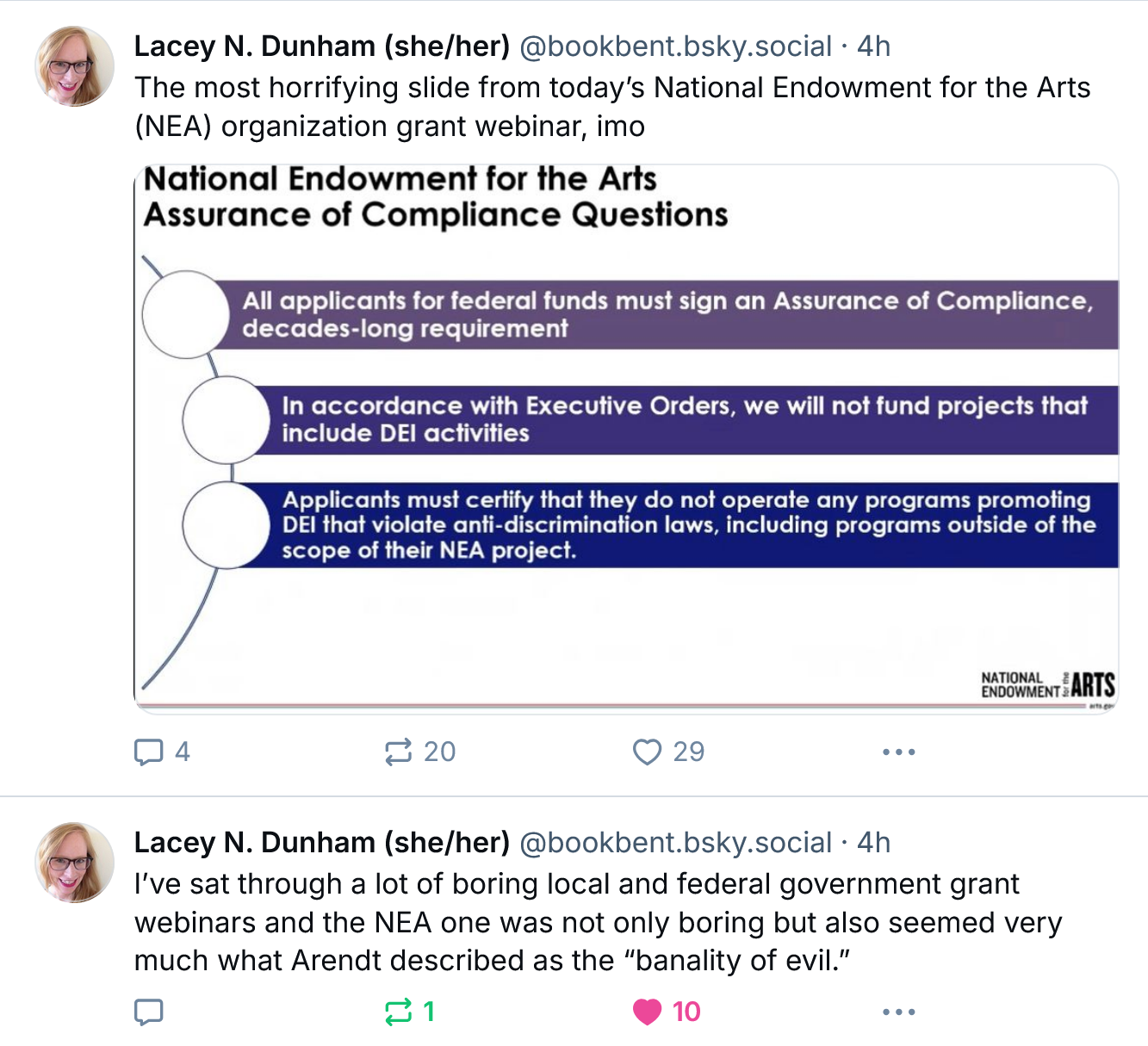
I asked Lacey if there was a Q&A, and whether any of the "gender ideology" text was addressed, or how they defended their decisions. She said, in effect, that they didn't. The questions were "pointless, pre-submitted, and generally along the lines of logistics and budget. It was a total charade," she said. "They didn’t address anything head on, including gender ideology (at least that I heard). It was very much a bureaucrat’s forum. The presenters seemed to be reading from a script (don’t know if that’s typical)."
In my experience, it isn't. I've sat through a lot of these too. There's always a bit of a script as they click you through their PowerPoint, but policing questions sent in by prospective applicants to remove anything that might be controversial is not normal. Most of these places just open up the Q&A box on Zoom or let you raise your hand and unmute your mic. Given what we know, and can assume, about the epic tidal wave of wrath, confusion, grief, despair, frustration and general negative feelings that prospective applicants are having right now, to host a sham of a community forum where the only questions you answer are about application logistics is more of a slap in the face than not making yourself available at all.
As a federal government agency, the NEA has never been as radical or progressive as many of us wish it was, and they've caved to political pressure before; the cuts to individual artist fellowships (now only available in a few select fields, like poetry and jazz) came about in the early 1990's after Jesse Helms and Congressional Republicans targeted two visual artists whose work was on display at museums funded by the NEA: Andres Serrano's "Piss Christ" installation, where a crucifix was submerged in a vial of blood and urine, and Robert Mapplethorpe's unapologetically queer photography, which often featured male nudes. Serrano and Mapplethorpe didn't create that art with NEA money; the museums got NEA funding to present their exhibits. Still, it was enough to deem individual artist fellowships too risky to continue funding, and to implement an anti-indecency clause which is still in the grant guidelines to this day. And those changes did trickle down to states; the Oregon Arts Commission, for example, can and does offer individual artist fellowships of their own, but they can't use their NEA funds to do it.
Even if, by some kind of miracle, all of this chaos and ugliness only lasted one year, and by this time in 2026 the NEA will have rolled back the changes, the damage in many places is already done; there are thorny moral questions around how this makes us all feel about each other which won't be resolved by bringing the Challenge America grants back and pretending this never happened. What do we do with the ever-encroaching sense that this is all beginning to feel a bit Vichy-coded? How do we deal with arts organizations in our own communities we used to support and love, who saw those new terms in writing and agreed to them, because they wanted the money badly enough that "gender ideology" seemed like a minor short-term compromise worth making?
If state agencies like the OAC choose to stand behind their equity mission, and lose a million dollars a year in funding because of it, taking a huge bite out of everybody's annual operating grants, how long until the repercussions of that begin creating rifts between arts organizations? If you had to cancel your small town's annual mural festival because you didn't get your state funding, where does blame go? To Trump and his voters, who enabled this . . . even if those voters are your neighbors? To the cowardly federal agency leaders who rolled over before there really was a gun to their heads? Or will it go, as always, enabled by conservative media, toward those woke leftists in the big city with their DEI and their pronouns who keep shoving change down everybody's throats? How soon until we begin to lose even the small ways that arts and culture can be havens for LGBTQ+ people in isolated communities, because negative polarization has a hard dollar value attached to it now?
The first really beautiful response I saw to these changes arrived in my inbox from a playwrights organization and NEA grant recipient called The New Harmony Project, in an open letter entitled "Our Values Are Not For Sale." It is not lengthy, but every word is perfect, and I encourage you to click through and read the whole thing. The letter quotes the NEA's own strategic plan, which emphasized uplifting marginalized voices, and references President Johnson's speech at the groundbreaking ceremony for the Kennedy Center in 1964, which was quoted on the NEA website: "'There is a quality in art which speaks across the gulf dividing man from man and nation from nation, and century from century. That quality confirms the faith that our common hopes may be more enduring than our conflicting hostilities.'" They forcefully call out the fact that telling arts organizations to betray their equity values is against the NEA's own values, and indeed its very purpose for existence. I posted a thread on Bluesky a few days ago after seeing a news article that the Playwrights Center in Minneapolis had taken a similar stand, refusing to compromise on their equity work just to get more NEA money. I'm hopeful we'll see more organizations do this.
"It's classic fascist language to pretend that we have a gender ideology and they don't, and that their lies and distortions of biology are truth, while their attacks on women are protection," said feminist icon Rebecca Solnit last week in an excellent essay entitled "To Use Their Language Is to Endorse Their Lies," about the way the Trump administration has weaponized the very meanings of words in service of their agenda, specifically calling out the crisis at the NEA as an example. "The language belongs to all of us and to each of us, and under most situations short of torture and imprisonment most of us have some agency in how we use it. Authoritarians recognize that authority over language itself is vital to their power . . . Going along with them is a surrender most of us don't have to engage in."
You may have also seen the news that Trump fired the whole board of the Kennedy Center for the Performing Arts and appointed himself its new chair. If you're wondering how in God's name that's legal, so am I, and I'd give anything for a copy of those bylaws, because this seems like a real gray area between "obeying in advance" (the first thing scholar Timothy Snyder tells us not to do in his oft-quoted book On Tyranny) and surrendering with a gun to your head. And as Bob Hicks wrote in a great Oregon Arts Watch piece putting both the NEA and Kennedy Center debacles in context, the danger is in dismissing these incidents as small potatoes. "Among the many federal funding freezes that Trump and Musk have attempted to put in place," Hicks writes, "are grants to libraries, archives, and museums – which, combined with the aim to eliminate the U.S. Department of Education, amounts to an all-out war on learning and knowledge, which are intimately entwined with culture and the arts, and thus with the nurturing of an informed and broadly thinking electorate."
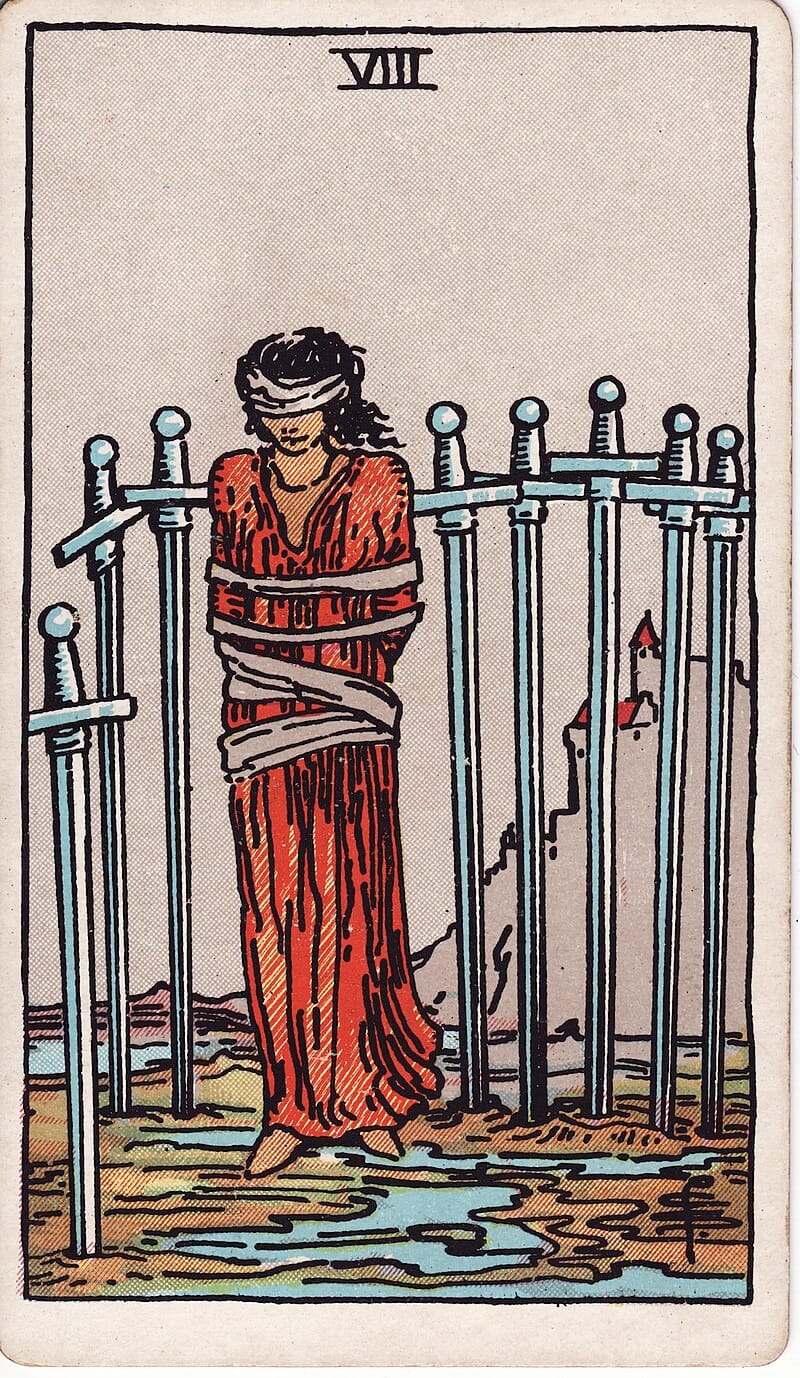
The Eight of Swords in the traditional Rider Waite Colman-Smith tarot deck, as shown above, depicts a blindfolded woman whose arms are bound to her sides, constrained by several loops of rope. She stands inside a kind of semicircle composed of eight swords nearly as tall as she is, their blades buried deep in the ground. To her left and right, they bristle fearsomely, like the bars of a prison or cage. But the most important detail is that the path ahead of her is free. There are swords all around her, and with a blindfold on, she must be bumping into them with every disoriented step, which would be terrifying; but she isn't really trapped. She only thinks that she is.
In tarot, swords are the suit associated with the mind; they represent thoughts, intellect, cognition, decisions. The blindfolded woman is in an entirely imagined prison. There's a castle behind her, off in the distance; is that the place where she was held captive? Has she already escaped once, and now fears she's trapped again? How many times has she tried to get free but ran into a sword, thinking it was a barrier? Her emotional response to this is real, and we couldn't blame her for being scared; but if the castle was the real prison, it's behind her. This one is mental, and she's the only one who can save herself. If she shifted her thinking, say, and learned to see the blades as tools, maybe she could cut her hands free. Then she could shed the bindings which have blinded and hobbled her, and see that she's actually free to make a choice. She could move forward, if she wanted to. Nobody is holding her here except her own mind. "If this person were to remove the blindfold," writes tarot author Jessica Dore, "to be willing to see and deal with whatever is there in the present moment - they would realize there are many ways to engage with a sharp thing other than to build a life around avoiding it."
I'm thinking about the Eight of Swords tonight as I wrestle with my deep sense of anger and betrayal at the leadership of the NEA, because none of us were in the room where any of these decisions were made, and that means none of us knows what immediately precipitated them. But it feels qualitatively different than the dismantling of other agencies, and the NEA isn't the only one doing it. The National Endowment for the Humanities took a nearly identical tack and you can see from this link here that their new guidelines are just as grim. (Thanks so much to Maigen on Bluesky who sent them to me.) We've all been reading daily about funding cuts in science and education, for example, which are regularly announced by Trump's officials, sometimes even after the agency had distributed the funds; the new head of the EPA is trying to claw back like $20 million that's already been distributed, which is just, like . . . screamingly illegal. And science grants are getting canceled because Trump's team has come right out and declared that they're choking off those dollars at the source.
But no one has said that about the NEA anyplace that I have seen or heard it. No one has stepped down. No one has sent out an email saying "don't worry, everyone, we are doing our best to fight this in the courts." They have, in fact, said almost nothing, and the evasiveness is jaw-dropping. The Chicago Sun-Times reached out to them for a comment on an article about cuts that affected Chicago arts organizations (read more on it here), and got this back from NEA spokeswoman Elizabeth Auclair: "This change to Challenge America will allow the NEA to more efficiently process grant applications this year. Under Grants for Arts Projects, the NEA will continue to support excellent arts projects of all kinds, including those serving rural, urban, suburban, and tribal communities of all sizes, and those that engage with individuals whose opportunities to experience and participate in the arts are limited."
Oh, interesting. So you're still committed to serving a DIVERSE range of populations and providing EQUITABLE access to the arts to INCLUDE specifically the populations who have least access to this programming. Yet you plan to do this without any of the organizations who apply to you every year to do exactly this work? Hmmm.
Budgets are moral documents, remember. Always. Without fail. Even if you try to hide it away behind cold, practical words like "to more efficiently process grant applications." Even if you pretend none of this is about how you, personally, will ever look your trans friends in the eye again, or indeed connected to your personal beliefs at all.
The thing about the Eight of Swords is that sometimes people are trapped. Maybe that castle behind her has a dungeon full of other people, who really can't get out. All month we've been seeing federal officials resign rather than comply with illegal orders, or risk their necks by making public statements of defiance, or taking their cases to the courts. Things are definitely very bad, and some of them will get worse; but there's a strong case to be made that a "fuck you, make me" approach can be pretty successful in undoing some of these changes. We see new examples of it every day. The NEA hasn't done any of this; if they have, they've done it behind closed doors. So was the danger even real? How bad was it? Or did they simply decide it was easier to play nice with a fascist regime so committed to erasing trans people that someone went into the National Parks Service website (NPS staff says it wasn't them) to remove all mention of them from the official Stonewall National Monument page, describing it as a milestone in "LGB history" and referencing the "LGB flag"?
It's so easy to see the stories we tell ourselves about how we're still on the right side of that moral line. "We'll just quietly cancel the Challenge America grants and silence trans artists for the next four years, but the minute a friendlier administration is sworn in, we'll totally bring it all back." That's probably what NEA leadership told themselves back in the 90's under attack from Jesse Helms, and guess what: that "indecency" clause is still in there 35 years later. The next generations of Robert Mapplethorpes will never get NEA funding again.
Fascism is not a rubber band that snaps back once pressure is released. It's the lumbering wheels of change at every level of the government, grinding the most vulnerable people into the ground, making changes now that are going to hurt us all for a long, long time, and insisting we can't get mad at them because they're trapped in that circle of swords . . . before they even take off the blindfold to see whether or not that's really true.
"Do not obey in advance," says Timothy Snyder. "Most of the power of authoritarianism is freely given. In times like these, individuals think ahead about what a more repressive government will want, and then offer themselves without being asked. A citizen who adapts in this way is teaching power what it can do."
How Do We Resist?
Okay, so, granted that this is all extremely bad . . . what do we do about it?
First of all, if you work for an arts organization (whether you're an NEA grant recipient or not), there's a webinar on February 21st hosted by the Arts Action Fund and Americans for the Arts featuring a Q&A with Trump's new NEA appointee, Mary Ann Carter. I plan to be there and will be live-blogging it on Bluesky as much as I can. You should join me if you're able. The registration information is here.
Second of all, if you work for an arts organization which is a current or past NEA grant recipient, I think the more of us who send email blasts to our audiences like that letter from The New Harmony Project, the better. This is unlikely to be on the radars of low-information voters yet, and we're their best source for hearing about it and understanding it. You know that if this ever makes it to Fox News, it will be framed like "why is the government spending our hard-earned tax dollars on a pornographic transgender musical about Gaza and the Mexican border" or something unhinged like that; you might be the best people to explain to your elderly white suburban subscribers that this affects things they like, too. (You know what my opera client's NEA grant last year was for? A stage adaptation of that adorable kids' book The Snowy Day by Ezra Jack Keats. That's where these grants are really going.)
(Though I would absolutely watch that musical I just made up.)
Thirdly: if a grantee has taken a public stand repudiating the NEA, they're doing so knowing it will probably get them blacklisted. This would be a nice time to throw a couple bucks to places like Playwrights Center (Minneapolis), New Harmony Project (Indianapolis), The Chicago Latino Theater Alliance, or any of the other arts orgs mentioned in the articles linked above who are choosing to stand behind their equity work even if it means losing money.
Fourth, reach out to arts orgs in your own community you have a relationship with who have received past NEA grant funding, and ask them if they plan to take a stand on this. You can search their whole database at https://apps.nea.gov/grantsearch/ or look up info state by state in their recent press releases, which are all linked here. I think it's fair to let this affect where you choose to spend your money in terms of tickets, subscriptions, events, and donations, as long as you tell them why. We can't afford to bury any more of this in the fine print.
Fifth of all, don't forget to mention the arts when you contact your legislators! I'll be attending two House rep town halls this week for this very reason, but phone calls and letters are also great and super helpful. This is especially true if you have a story to tell about how these cuts affect your organization personally.
Personally, I've decided to add a clause to my contracts going forward that I won't write grants to the NEA or any other federal agency where this executive order language is included in the requirements. That doesn't mean no federal grants at all; some agencies and programs who are flying below the radar may be able to keep funding folks to keep doing the work they've been doing if you're able to strip those SEO keywords out of it for the word search monkeys on Musk's team. That's fine with me. But I can't sign off on a promise to disavow "gender ideology." NEA grants take a lot of hours, are incredibly difficult, and I'm very good at them; but I'm just not willing to let my skills be used to petition for funding from people who were willing to sacrifice our most vulnerable populations before anybody even ordered them to. Now, I offer this with the caveat that not everyone is in a position to make this choice. I'm by no means saying that a salaried junior nonprofit employee should quit their job rather than write an NEA grant, and if they don't it means they hate trans people. I am a consultant and I choose my own clients, which means I have some leverage, and one way I'm trying to use it is to help support clients in finding new funding from progressive sources to protect their commitment to their equity work. (My next Prospect Research workshop is on March 8th, and I'm happy to use some of that time to help you guys and your arts organizations do the same research.)
Don't give up and accept this all as inevitable. Finding concrete actions to take, through places like Indivisible or MoveOn or mutual aid networks in your community (Bluesky is great for this), will help you feel less powerless. The arts are hard to fight for, in tough times, when we face so many other dire crises; but we have to keep reminding ourselves of why they matter. Why is it an existential threat to conservative thinking if our communities have libraries and museums and theatres, if we're surrounded by art and music and literature and rich humanities programming reflecting as many different points of view as our minds can hold? Because those are the places where kids discover that the world is bigger than what your parents are watching every night on Fox News. Those are places you can go to feel safe and seen and free to be yourself, if maybe you can't at home or school or work. Those are places where the human drive to share stories brings us together, where an audience member can put themselves in the shoes of someone different from them and realize everything you were told about those people was wrong. The arts make us ask bigger questions, and that makes them both dangerous and important. Removing them from your budget tells us everything we need to know about who you really are.
The NEA's call for art commemorating 250 years of America was part of the grant guidelines before all this; a year ago, under a Democratic administration and probably anticipating another one, the context for that would have felt quite different. We might have gotten some really bold, challenging, complex, boundary-pushing art out of it. That's what a National Endowment for the Arts is supposed to be helping make possible, and we still need those stories - even more than we did before. And certainly more than we need the kind of art that the Trump administration actually approves of and agrees with. I hope those artists keep making their art, and find other ways to fund it. I hope everyone who had an idea they now can't submit to the NEA, because it's too controversial for grant funding, finds a way to tell that story anyway. This, above all else, is the way we fight back: that no matter what happens, artists must keep making our art, as loudly and unapologetically as we can - queer art, indigenous art, Black art, trans art, Jewish art, Muslim art, art by women, art by immigrants, art by all the people these changes are committed to silencing.
In a world of Jesse Helmses, be a Robert Mapplethorpe. Take the blindfold off, and keep walking.
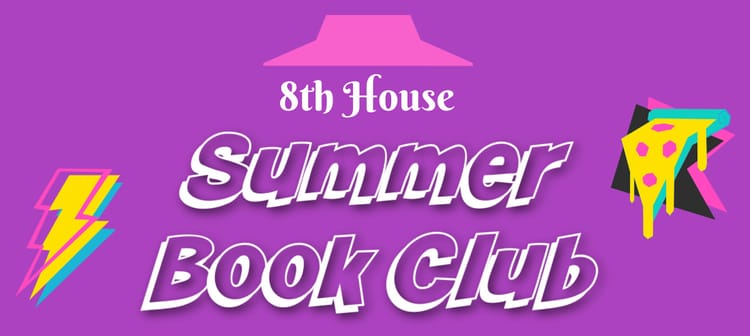
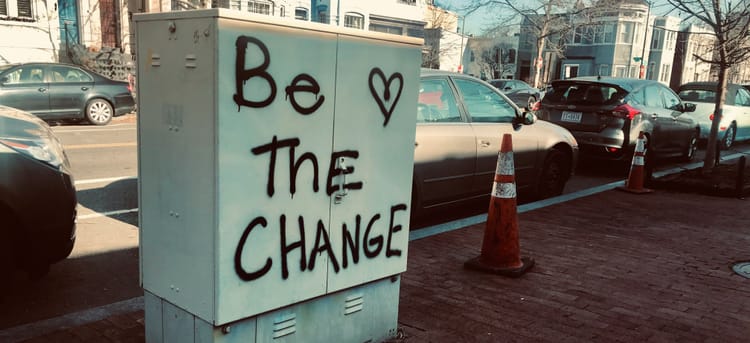


Member discussion